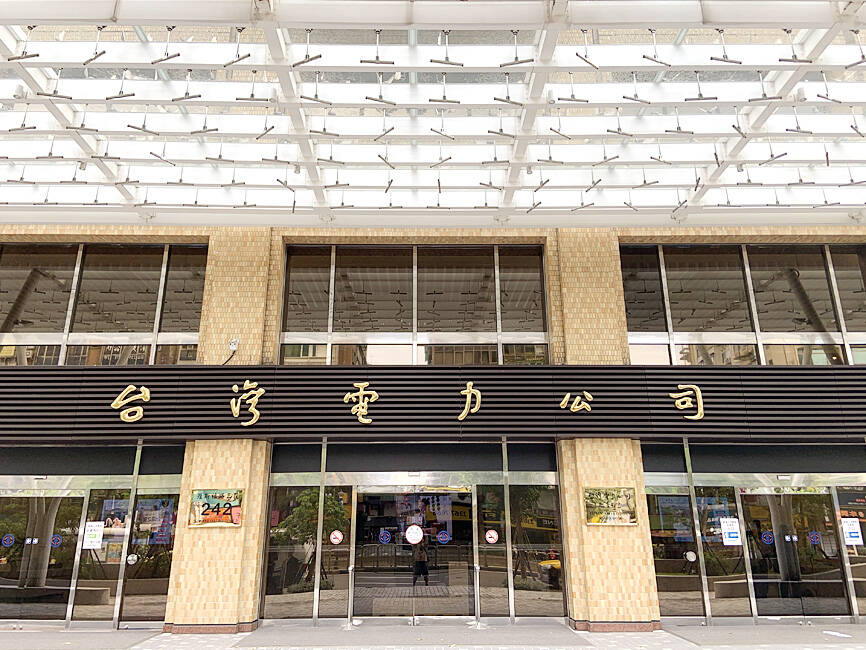State-owned utility Taiwan Power Co (Taipower, 台電) has made its last payment for Russian coal under a deal signed before the war in Ukraine and would not enter into any new purchase agreements with Russia, a company spokesperson said yesterday.
Taiwan has joined in Western-led sanctions against Russia for its invasion of Ukraine, keen to show it is a responsible member of the international community, and the government has condemned Russia for its actions.
Taipower spokesperson Wu Chin-chung (吳進忠) said that before the war the company had agreed to buy 1.16 million tonnes of coal this year from Russia for US$280 million.

Photo: Tu Chien-jung, Taipei Times
The final payment of US$150 million was made this month and no further coal would be bought from Russia, with coal coming instead from Indonesia, Australia, Colombia and South Africa, Wu said.
Most coals procured by Taipower are from Indonesia and Australia and a few of coals are from Russia, the company’s Web site showed.
The coals from Australia and Russia are bituminous coals that can provide higher heating value, while those from Indonesia are sub-bituminous coals with extremely low ash content, the Web site showed.
Wu’s remark came after a Finnish think tank said that Japan, South Korea and Taiwan imported US$5.5 billion of fossil fuels from Russia in the first five months of this year following the war in Ukraine.
The Helsinki-based Center for Energy and Clear Air Research estimated that Japan purchased US$2.6 billion of Russian coal, oil and gas between Feb. 24 and July 31, while South Korea purchased US$1.7 billion of Russian fuels during this period and Taiwan US$1.2 billion, Nikkei Asia reported on Tuesday.
China imported about US$28 billion of Russian energy over the period, making it the world’s largest buyer, the report said, citing the center’s estimate.
Additional reporting by Chen Cheng-hui

UNCERTAINTY: Innolux activated a stringent supply chain management mechanism, as it did during the COVID-19 pandemic, to ensure optimal inventory levels for customers Flat-panel display makers AUO Corp (友達) and Innolux Corp (群創) yesterday said that about 12 to 20 percent of their display business is at risk of potential US tariffs and that they would relocate production or shipment destinations to mitigate the levies’ effects. US tariffs would have a direct impact of US$200 million on AUO’s revenue, company chairman Paul Peng (彭雙浪) told reporters on the sidelines of the Touch Taiwan trade show in Taipei yesterday. That would make up about 12 percent of the company’s overall revenue. To cope with the tariff uncertainty, AUO plans to allocate its production to manufacturing facilities in

TAKING STOCK: A Taiwanese cookware firm in Vietnam urged customers to assess inventory or place orders early so shipments can reach the US while tariffs are paused Taiwanese businesses in Vietnam are exploring alternatives after the White House imposed a 46 percent import duty on Vietnamese goods, following US President Donald Trump’s announcement of “reciprocal” tariffs on the US’ trading partners. Lo Shih-liang (羅世良), chairman of Brico Industry Co (裕茂工業), a Taiwanese company that manufactures cast iron cookware and stove components in Vietnam, said that more than 40 percent of his business was tied to the US market, describing the constant US policy shifts as an emotional roller coaster. “I work during the day and stay up all night watching the news. I’ve been following US news until 3am

COLLABORATION: Given Taiwan’s key position in global supply chains, the US firm is discussing strategies with local partners and clients to deal with global uncertainties Advanced Micro Devices Inc (AMD) yesterday said it is meeting with local ecosystem partners, including Taiwan Semiconductor Manufacturing Co (TSMC, 台積電), to discuss strategies, including long-term manufacturing, to navigate uncertainties such as US tariffs, as Taiwan occupies an important position in global supply chains. AMD chief executive officer Lisa Su (蘇姿丰) told reporters that Taiwan is an important part of the chip designer’s ecosystem and she is discussing with partners and customers in Taiwan to forge strong collaborations on different areas during this critical period. AMD has just become the first artificial-intelligence (AI) server chip customer of TSMC to utilize its advanced

Six years ago, LVMH’s billionaire CEO Bernard Arnault and US President Donald Trump cut the blue ribbon on a factory in rural Texas that would make designer handbags for Louis Vuitton, one of the world’s best-known luxury brands. However, since the high-profile opening, the factory has faced a host of problems limiting production, 11 former Louis Vuitton employees said. The site has consistently ranked among the worst-performing for Louis Vuitton globally, “significantly” underperforming other facilities, said three former Louis Vuitton workers and a senior industry source, who cited internal rankings shared with staff. The plant’s problems — which have not